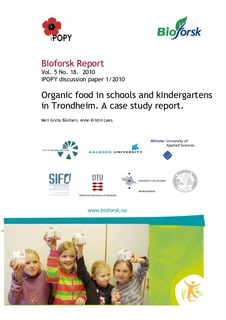| dc.description.abstract | In October 2007, the municipality of Trondheim, Norway decided to increase the public consumption of organic food. The share of public schools and kindergartens offering organic food should be increased by 20 % within 2011, as compared to 2007. Trondheim has for several years had an ambitious aim to increase the consciousness among children and youth about environmental issues, and the project “Children‟s Green City” had been an important tool in this work. The decision made it relevant for the research project “innovative Public Organic food Procurement for Youth” (iPOPY) to use Trondheim as a research case. This report describes the background for the municipal decision about organic food, and what has been done to implement it. Several employees in the municipality and other stakeholders have been interviewed. Even if the decision puts up a quite modest goal, there are several challenges to achieve it. The point of departure (how much organic food was served by kindergartens and schools in 2007) is unknown, and hence the progress is difficult to measure. In the public purchasing agreement, the municipality has obliged its appointed wholesaler to offer organic products. The intention was that the units (e.g. schools) would get easier access to organic food, and that the demand would increase, making it possible for more local farmers to convert to organic. Purchasing agreements are an important tool, but they have to be carefully designed and developed with time. The largest challenge to achieve the organic goal in Trondheim is to motivate actors who may influence the purchase of food, and to anchor the intentions in the decision in such a large organisation as the municipality is. A committed and continuous effort is required. Education and training of staff in charge of food serving in schools and kindergartens is a fruitful strategy, which has been used successfully by Children‟s Green City for several years. | nb_NO |
